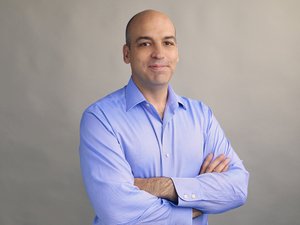Much of UpSurge Baltimore CEO Jamie McDonald's job is to keep track of the startups and venture capital firms that make up Baltimore's tech ecosystem. Yet even she can't keep track of everything happening in the industry right now.
"I'm thrilled when we hear about a company that we haven't heard of," McDonald said. "There are so many amazing companies that we're already working with and, although I want us to have perfect knowledge, that would mean [Baltimore] is not growing fast enough."
McDonald made that remark while discussing a meeting she had several months ago with Resolve Growth Partners, one of the many new venture capital firms that have sprung up in Greater Baltimore over the last few years. Even as the number of startups in Charm City has increased over the past decade — the number of startups in Baltimore with some venture funding rose from 102 in 2013 to 350 last year — the increase in locally founded venture capital firms has been especially notable. Of the top 24 investors who have made the most investments into Baltimore startups as tracked by UpSurge, nearly 30% weren’t active in 2021.
Those new venture capital firms include ones started by former founders, like Luke Cooper’s Latimer Ventures, some started by local venture capital veterans, like Mike Leffer’s Riptide Ventures and McKeever “Mac” Conwell II’s RareBreed Ventures, and others started by large companies, such as the $25 million venture capital fund that Columbia public company Tenable Inc. launched earlier this year.
Local tech leaders say all the new firms are a positive sign for the growing industry since it means the region has enough startups to take advantage of the local dollars and enables many young companies to stay in Greater Baltimore instead of moving across the country to chase elusive venture capital dollars.
But despite the maturing venture capital scene, the local tech industry still has a ways to go when it comes to creating a robust funding environment. Many of the venture funds founded in the region are only raising tens of millions of dollars, rather than the hundreds of millions seen in more established cities like Boston or New York. There's also a lack of pre-seed funding available to early-stage companies, a gap that has only been partially filled by government-backed funds.
“I think it's really important for us to be able to have the breadth of funding across the entrepreneurial journey,” said Jeff Cherry, one of the city's early venture capital investors who started Conscious Venture Lab, a 12-week accelerator program, in 2013. “From pre-seed all the way all the way through series, A, B, and C. It's important to have money along that whole path. So entrepreneurs can stay put.”
While Baltimore has historically lacked the larger venture capital funds that can fuel large rounds, the number of large local funds has increased over the past couple of years. Victor Velculescu, CEO of Delfi Diagnostics, said the successes of local startups like the early cancer detection company Personal Genome Diagnostics have made the city a more attractive place to invest. Delfi raised $225 million during a series B funding round last year, one of the largest venture capital rounds in Baltimore’s history.
The Covid-19 pandemic has also caused existing venture capital firms across the country to be open to virtual meetings, Velculescu said, which has made it easier for Baltimore-based companies to court firms from other states.
"The Covid pandemic has increased the ability of VCs to look outside their bubble," Velculescu said.
Even though videoconferencing has made it easier to attract investors from outside Maryland, there is still pressure on startups to live near their funders for informal meetings, making a local supply of venture capital firms important, said Conwell, who started RareBreed in 2020 and is currently raising a $40 million fund.
"I can go out for coffee, to happy hour or to an event with folks who are here, as opposed to trying to build relationships on Zoom with people in Toronto or California," he said.
McDonald believes the advent of accelerators like Techstars that both invest in companies directly and help startups gain notoriety is a key driver causing the boost in local investment. Local companies have also made a stronger effort to invest in the startup ecosystem. Brown Advisory jumped 26 places on Upsurge's list and notable institutions like the University of Maryland Medical System have invested in local tech firms like Upsurge and Cherry's Conscious Venture Partners.
McDonald believes the most pressing need is for an increase in seed and pre-seed investment. A lack of early-stage investment can kill a business before it gets the chance to be born, since entrepreneurs may lack the resources to build a prototype without early capital. It’s easier for businesses to gain attention from funders outside of Baltimore if they are more mature, but an early-stage company often almost solely relies on investment from the local region, especially in the pre-seed stage.
Deal activity in seed and angel investments fell to a two-and-a-half-year low last quarter across the nation. Combined, the investments represent 47% of all venture capital funding nationally, while last quarter those only made up 34%, according to Pitchbook. A lack of angel investment has made it difficult for early-stage Baltimore companies to get started, McDonald said.
“Groups that were pretty active before Covid, like Baltimore angels, are not as engaged as they once were. There has not been an angel group that stepped in to fill the void,” McDonald said.
The decline in angel funding is caused by the decline in the stock market, said Leffer, who runs Riptide Ventures, an angel syndicate. When the stock market is down wealthy people see a decline in their investment portfolios, so they have less money to invest in startups. Ironically bad economic conditions are often a good time to invest, Leffer said, since startup evaluations are relatively low.
An angel syndicate like Riptide is able to open up investing to a wider net of investors that can help remediate the lack of interest stemming from the stock market decline. Many high-net-worth individuals may only want to invest around $5,000 in a company but are unable to contribute such as small amount to fund a round because of SEC rules. By pooling their wealth with other angel investors, people are able to make smaller investments that would otherwise be impossible. Unlike a traditional venture capital fund the specific investments are still determined by the angel investors, not a fund manager.
"We provide exposure to really good companies, for investors that they (invest) into as individuals writing smaller checks," Leffer said.
Government funders can often step in to fill the gap for pre-seed funding, especially for minority business owners, who often lack the family wealth and connections of their white counterparts. Public agencies can have very targeted investments in very early-stage companies that private venture capital firms might ignore, helping Maryland entrepreneurs get ready to receive wider private capital investment. Of UpSurge's top five funders of Baltimore companies, three of them are government agencies.
The Maryland Technology Development Corp. (TEDCO) is trying to push for a more diverse ecosystem through the creation of a new equitech fund. The bill, signed by Gov. Wes Moore on May 8, will invest $5 million a year for eight years into the technology sector to boost Maryland job growth and complement TEDCO’s existing programs.
The extra influx of government funding could help Maryland catch up to competing states like North Carolina and Massachusetts that have invested hundreds of millions of dollars into its life science industries, according to a TEDCO report. Upsurge believes that more institutions like large universities as well as wealthy individuals should also support the technology industry. Maryland's startup ecosystem might be growing, but it is still a young industry trying to weather the storm of a national decline in technology funding.
“We need to figure out how do we get the rest of this money off the sidelines and going into these funds,” Cherry said. “Because there's a ton of opportunity here.”










